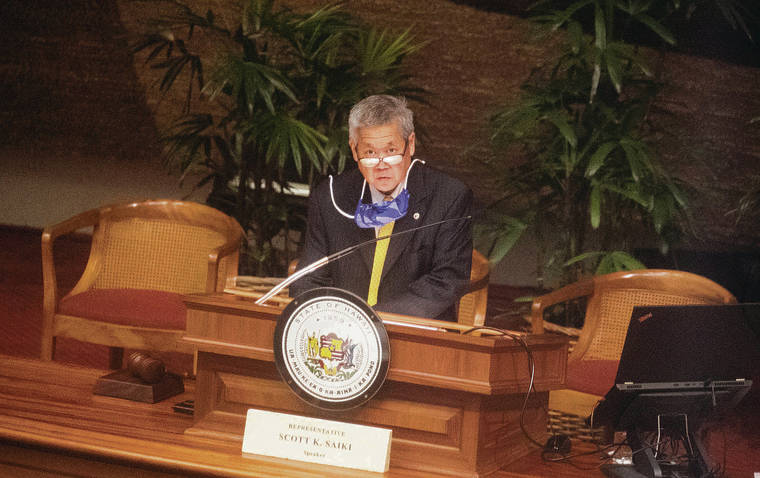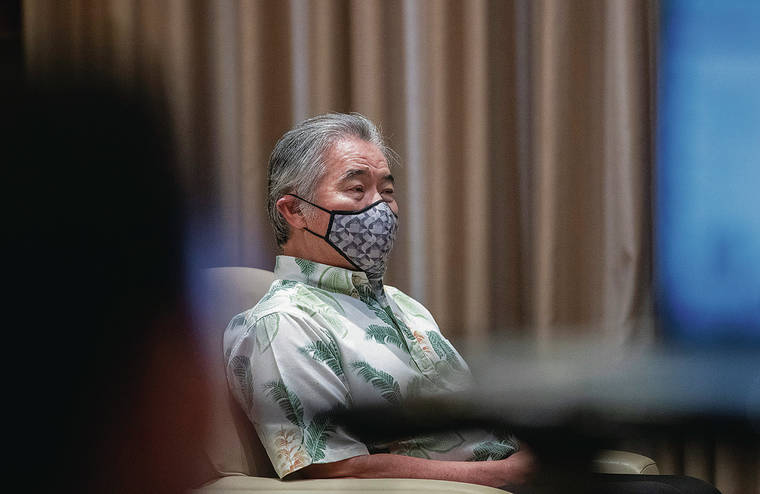Hawaii lawmakers’ frustration with Gov. Ige heats up as they move $1.3B into ‘rainy day’ fund

CINDY ELLEN RUSSELL / MAY 11
Hawaii House Speaker Scott K. Saiki is seen through the window of the House chamber on opening day of the abbreviated session of the state Legislature. Media and the public were kept out of the session.

STAR-ADVERTISER / APRIL 14
Gov. David Ige wears a face mask prior to a news conference at the State Capitol last month.


Simmering frustration between Gov. David Ige and the state Legislature approached the boiling point today as lawmakers voted to move more than $1.3 billion into the state’s “rainy day” budget reserve fund — where they believe it will be out of Ige’s reach — and the Senate authorized a committee to issue subpoenas to pry information loose from the administration.
Senate Bill 75 Opens in a new tab would deposit nearly $636 million in federal CARES Act money into the rainy day budget reserve fund, while Senate Bill 3139 Opens in a new tab would transfer $452 million in other state funds into the rainy day reserves. SB 3139 also would authorize the Ige administration to transfer another $258 million to the budget reserve fund.
Both bills won final approval today from the Legislature in an abbreviated session called to address issues surrounding the COVID-19 pandemic Opens in a new tab, and the measures now go to Ige for his consideration. Ige declined through a spokeswoman to say if he intends to veto any of the bills.
Lawmakers also authorized Ige to borrow up to $2.1 billion from the federal government to cover state operating costs, and voted to distribute more than $175 million in CARES Act funding to Maui, Hawaii and Kauai counties.
The CARES Act was passed by the U.S. Congress and signed by President Trump in March to fund pandemic relief efforts.
Leading lawmakers have said they reconvened at the Capitol last week to identify funding Ige can use to balance the state budget so it won’t be necessary to impose public-worker pay cuts and furloughs next year.
Don't miss out on what's happening!
Stay in touch with breaking news, as it happens, conveniently in your email inbox. It's FREE!
Ige has said his administration must cope with a $1.5 billion budget shortfall over the next 15 months, while lawmakers contend the shortfall is only about $1 billion.
RELATED STORY: Hawaii’s head of economic development declines to allow staff to testify before Senate committee Opens in a new tab
Last month the governor told leaders of the public-worker unions he intended to impose 20% pay cuts for state employees including teachers, a plan that was immediately opposed by House Speaker Scott Saiki and Senate President Ron Kouchi.
Union leaders and others contend that cutting public workers’ pay would do more damage to the state economy and might prolong the economic downturn that has been triggered by the pandemic and the shutdown of Hawaii tourism.
Sens. Russell Ruderman and Laura Thielen today criticized the decision to deposit such large sums in the rainy day fund at a time when many Hawaii residents cannot afford food or rent, with Ruderman telling his colleagues that “we need to be the government that helps the people.”
“My point is the crisis is now, and it’s urgent, and soon we’re going to have a lot more homeless, a lot more hungry, a lot more people in permanent need of expensive social services,” said Ruderman, (D-Puna). “We should be putting aside our power struggles, our desire to stash and control money, and we should be helping our people as much as possible.”
But Senate Ways and Means Chairman Donovan Dela Cruz said lawmakers plan to return to the Capitol next month, and will have a better idea then of how much the budget shortfall might be, and how much additional federal support may be forthcoming.
While most of the state’s share of the CARES funding would be held in reserve in the rainy day fund until then, Dela Cruz said the counties will be using their share of the CARES funding to make grants to help with community social needs .
Dela Cruz told his colleagues that Chief State Economist Eugene Tian predicts it will take five years or more for the state’s tourism economy to recover, and “we need to think and act responsibly and prudently with the federal resources that are being provided us.”
“This legislative body understand the gravity of the situation and the impact on every resident of the state,” Dela Cruz said. “We owe the citizens of this state both immediate and long-term stability and security.”
State Budget Director Craig Hirai has warned lawmakers that there are restrictions on the use of money in the rainy day fund, and moving large amounts of CARES Act money into the rainy day fund may prevent the state from spending the money by Dec. 30 as required by the act. For example, lawmakers are not allowed to appropriate more than 50% of the money in the rainy day fund in any one fiscal year.
Any CARES Act money that the state fails to spend by the end of the year would have to be returned to the federal government.
The state received $862 million in federal funding under the CARES Act, and lawmakers are appropriated $80 million of that for Hawaii County, $66.5 million for Maui County and $28.7 million for Kauai County. Honolulu already has received a separate allocation of federal funding from the CARES Act.
The Senate also approved Senate Resolution 198 Opens in a new tab, which authorizes a Senate Special Investigating Committee on COVID-19 that could issue subpoenas if need be to obtain information from the administration. The Senate already has a Senate Special Committee on COVID-19 that has been holing hearings on the Ige administration response to the pandemic.
Senate President Ron Kouchi said the concern was that some Ige administration officials were instructed “not to share the information with the committee, and so they want to ensure that doesn’t happen.”




